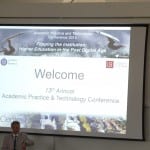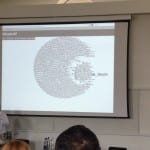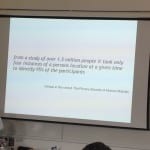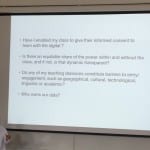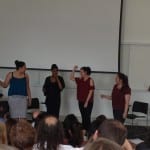Flipping the Institution at Greenwich #uogapt defined the post-digital age as taking computers and the internet for granted because they’ve always been there. But there are risks. The internet is exclusive. Digital access parameters replicate and reinforce existing categories of disempowerment. While those who are connected are increasingly tracked and monitored those who are disconnected are digitally discriminated and increasingly invisible. The post digital world is surveillance heavy and divisive.
Flipped learning ‘s focus on placing digital resources online provides timely opportunities to revisit what it means to develop digital literacies for all users; students and academics. Digital literacies have morphed into digital capabilities, the Jisc seven elements reduced to six and no one mentions SCONUL’s digital literacy lens anymore – which is a shame because it was explicit about the risks of digital divides.
Teaching decisions can constitute barriers to access and engagement and speakers Jonathan Worth, David White and Helen Beetham made reference to the risks of being digitally connected and disconnected. Their presentations reinforced the value of events like these.
Here are my key takeaways from the day.
If you are not on twitter you are excluding yourself from relevant conversations.
The first waves of technology was plugging it in and using it. The second post digital wave is using it innovatively.
Open education demonstrates the facilitation of learning through the use of social media for example Jonathan Worth’s open access photography course http://phonar.org/ #phonar
Other links worth following: Coventry University’s Disruptive Media Learning Lab http://dmll.org.uk #disruptivebytes and Speaking Openly http://speakingopenly.co.uk/ #speakingopenly. Visit Audrey Watters and Hack Education Read Dragnet Nation by Julia Angwin on the world of electronic surveillance
Digital Wellbeing means taking steps to know mobile devices track and store data about us. Quick surveillance check for iphones – go to Settings > Privacy > Location Services > System Services > Frequent Locations to see how you are monitored.
Questions to reflect on.
- What does inspiring teaching look like in a post digital age?
- Will the TEF include a measurement of digital engagement?
- How can reluctant and resistant academics be encourage to engage with virtual learning as more than an electronic repository of content?
- One outcome of post digital is the expectation people will be available online 24/7 in particular for work responses to emails. Is this right, fair or sustainable?
- Staff and students need to know how to construct and maintain professional digital identities and reputations. What we do online today in the digital world may influence future opportunities. How do we support digital responsibility?
Teaching decisions can constitute barriers to access and engagement. The digital amplifies existing inequality. We should all take personal responsibility within digital practices to recognise the potential for exclusion. Tackling digital exclusion needs awareness which leads to action. Digital exclusion is being rebranded by Jisc as social responsibility. There is a risk the reality of digital divides and exclusions will get lost in this change of language. Those within the digital sector might be aware of the inner meanings, but those outside will not.
The employability agenda is turning students into products for employers. This commodification reinforces the need to focus on ‘sense of self’ in the post digital age. We need to be equipped to live in a digital world. Like Media Studies taught students to deconstruct images to see the hidden discourse beneath, students now need to understand how social media frames them.
Multimedia is the new measure of digital literacy with video replacing text and image as preferred means of communication.
PechaKucha are short, sharp bursts of creative energy which challenge you to be concise and digitally capable. The format at Greenwich was ten slides in ten minutes which was fine; developing presentations like these would support digital confidence.
The student voice at Greenwich included a set of mini dramas showing the student side of ‘post digital’ education and a final reminder of how it’s the face-to-face experience which still has the power to educate and entertain.
